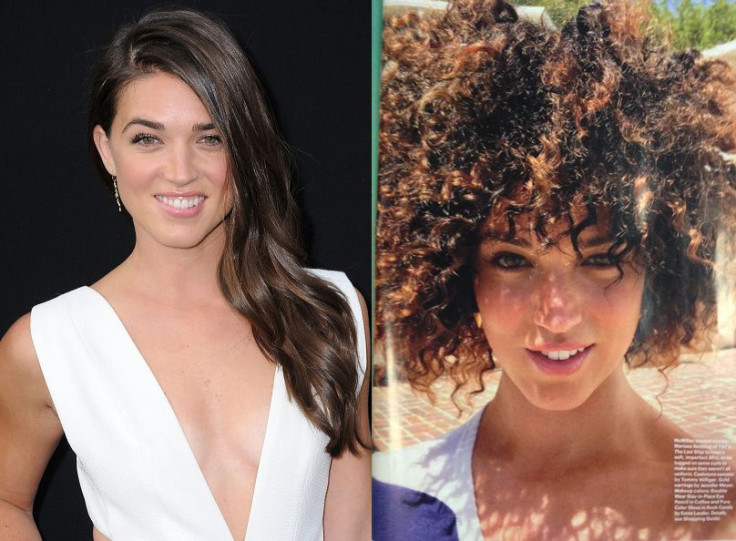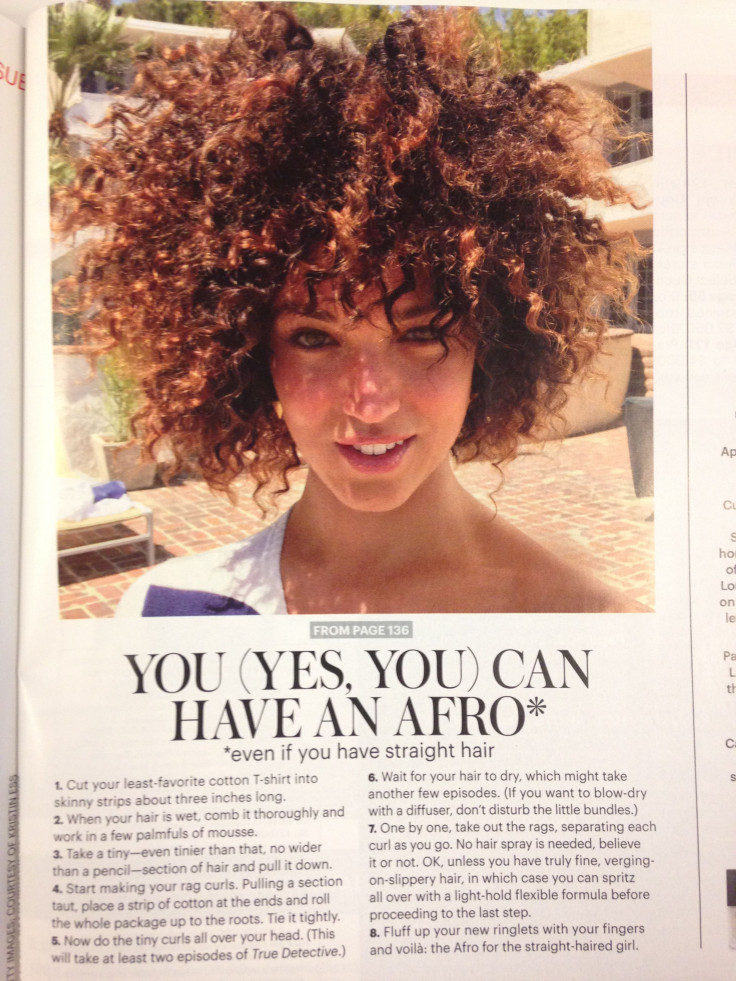Allure's Afro Tutorial For White Women: The Politics Of Black Hair In Post-Rachel Dolezal America

Allure magazine is getting critically pummeled Tuesday for running an afro hairstyle tutorial for white women in its August issue, with some critics noting the white model, actress Marissa Neitling, resembles Rachel Dolezal. Dolezal, you may recall, is the disgraced former president of the NAACP chapter in Spokane, Washington, who resigned in June after she was exposed for masquerading as a black woman.
In addition to ignoring its black readers, the feature divorces black hairstyles from the real politics of black hair and the discriminatory blowback black women and girls get for wearing their hair natural. And it participates in the shameful -- and yet strangely persistent -- practice of putting white models in blackface in fashion and beauty magazines.
'The Rachel' 2.0
The Allure article in question, titled "Retro Modern," featured vintage hairstyle ideas for contemporary readers, including the "Bowl Cut" and "Long Bangs." The "Loose Afro" on Neitling is described by Chris McMillan, Jennifer Aniston's longtime hairstylist and creator of the "Friends"-era "Rachel" cut, as "ballsy and powerful." In the back pages of Allure, a step-by-step tutorial seems to address a nonblack audience: "You (Yes, You) Can Have An Afro*" it reads, with the footnote "even if you have straight hair."

Glossy magazines typically have a three-to-four-month lead time for stories, and one industry insider who did not want to be named told IBTimes that it was likely the Dolezal scandal hit just before Allure's August issue went to press but was mostly likely not a part of the story's conception.
Whether Allure's editors were yet aware of the Dolezal scandal, they could not have been unaware that over the past few years, fashion and beauty magazines have gotten scathing critiques for being both racially insensitive and racially noninclusive in their editorials. Instead of using actual black models for fashion spreads, a number of fashion magazines have featured white models in blackface, sometimes styled as "African Queens," including white Dutch model Lara Stone and white German model Claudia Schiffer, all of which prompt accusations of cultural appropriation and racism.
Natural Hair Discrimination
Leaving aside the dearth of people of color as models in mainstream fashion and beauty magazines and offensive blackface fashion spreads, the cultural appropriation of black hairstyles ignores the fact that many black women are not able to wear a natural afro, namely due to social repercussions from white, mainstream America.
In 2013, Faith Christian Academy in Florida told 12-year-old Vanessa VanDyke that she would be expelled if she didn't cut her hair, which she wore naturally styled in an afro, reported MSNBC. School officials called her hair a “distraction." But after facing criticism, they said she could remain in school with her natural hair.
Latest blog post: Big Hair Don't Care? inspired by #vanessavandyke news http://t.co/bvmFl0zqMk #naturalhair #curlyhair #comment #blog #rt
— Kamillah Rose (@KamillahRose) December 4, 2013Natural hair discrimination flourishes in corporate America, according to Maryline Dossou of Ebony Magazine, who went natural when she didn't want to use harsh chemicals anymore to straighten her hair and soon learned natural black hairstyles were considered "unprofessional." Among the companies that have been accused of discriminating against natural hair styles are Air France, Six Flags and FedEx.
"Places that have denied employment to those with natural hairstyles like dreadlocks typically consider it an extreme hairstyle comparable to a Mohawk or unnatural hair coloring," writes Dossou. "But what they may not know is that there’s meaning behind wearing one’s hair natural and, at the very least, these hairstyles aren’t 'statements' but simply the way our hair grows out of our head."
This is an Afro. Not....this. @Allure_magazine pic.twitter.com/hkdsMdNG1t
— Brandy with a Y (@BtSquared2) August 2, 2015Naturally styled black hair figured prominently in the Black is Beautiful movement in the 1960s and 1970s, when black people began wearing their hair in afros as political statements.
"Black women didn’t start wearing afros to be cute," writes a blogger for Clutch in "No, White Women, You May Not Wear an Afro," a piece that responds to the Allure feature.
"Afros were an extension of the Black power movement of the late '60s and '70s. The hairstyle was a way for Black men and women to tell America they didn’t care what caricatures they put out about them in society. Black was beautiful and that included the thick, coarse, kinky, curly hair that naturally grew from their heads and was combed out into an afro that, big or small, couldn’t be ignored. "
Some black bloggers thought the execution of the Allure article was faulty, but they had no problem with teaching black hairstyles to white women. Diana Ozemebhoya Eromosele of The Root wrote, "It's OK that Allure wanted to teach women with straight hair how to achieve the Afro look, but a quick one-liner about the cultural context of the hairstyle would have been perfect."
'Good Hair'
Black hair is so fraught with meaning that it was even the subject of the documentary "Good Hair" (2009) directed by comedian Chris Rock. He was prompted to make the film, he once said, after his young daughter asked him, "Why don't I have good hair?" In the documentary, he talks about the lengths that many black women go to in order to straighten their hair, including using harsh chemicals or wearing painful and cumbersome weaves.
Comedian Paul Mooney explains what might be behind some of the motivation black women have to straighten their hair: "If your hair’s relaxed, white people are relaxed. If your hair is nappy, they’re not happy,” he jokes.
Blithely sidestepping the various political meanings of natural black hair and why it might be problematic to have a tutorial for white women on how to copy natural hairstyles from black women, a spokesperson from Allure responded to the controversy by telling Buzzfeed on Monday:
“The Afro has a rich cultural and aesthetic history. In this story, we show women using different hairstyles as an individual expressions [sic] of style. Using beauty and hair as a form of self-expression is a mirror of what’s happening in our country today. The creativity is limitless -- and pretty wonderful.”
© Copyright IBTimes 2024. All rights reserved.






















